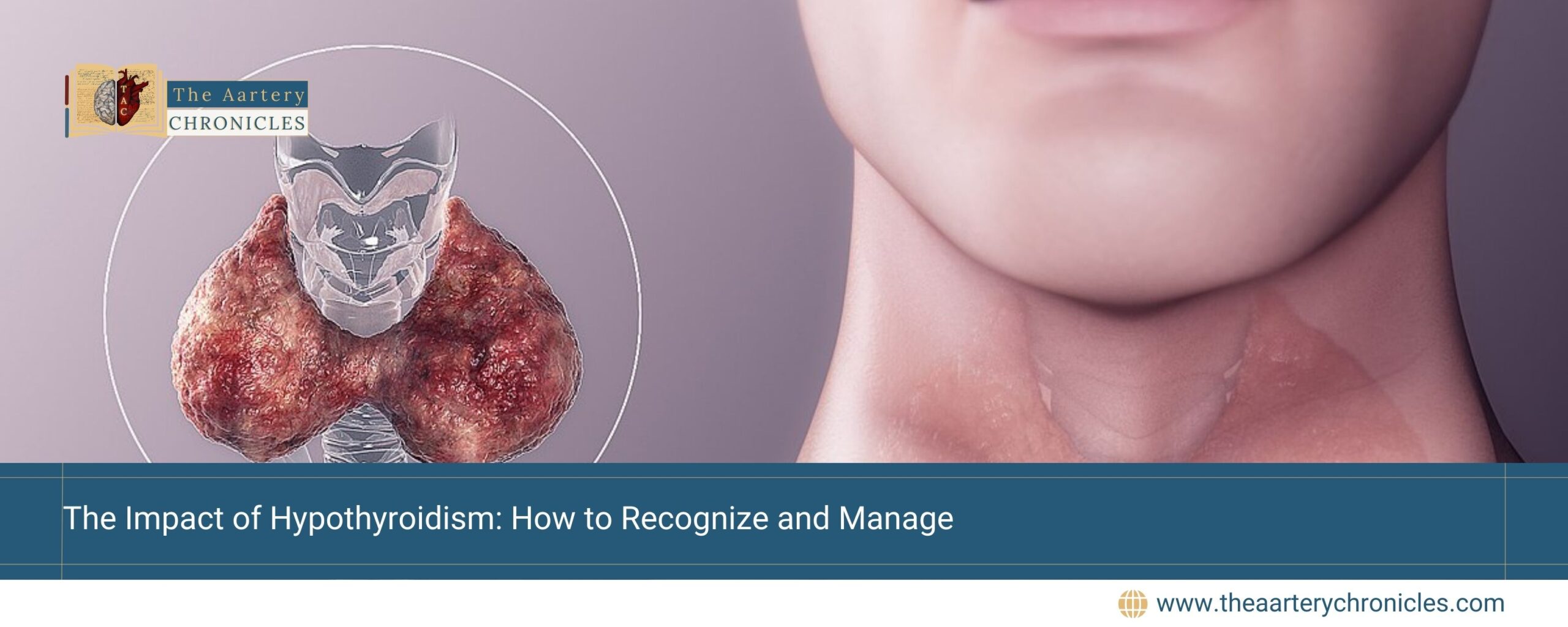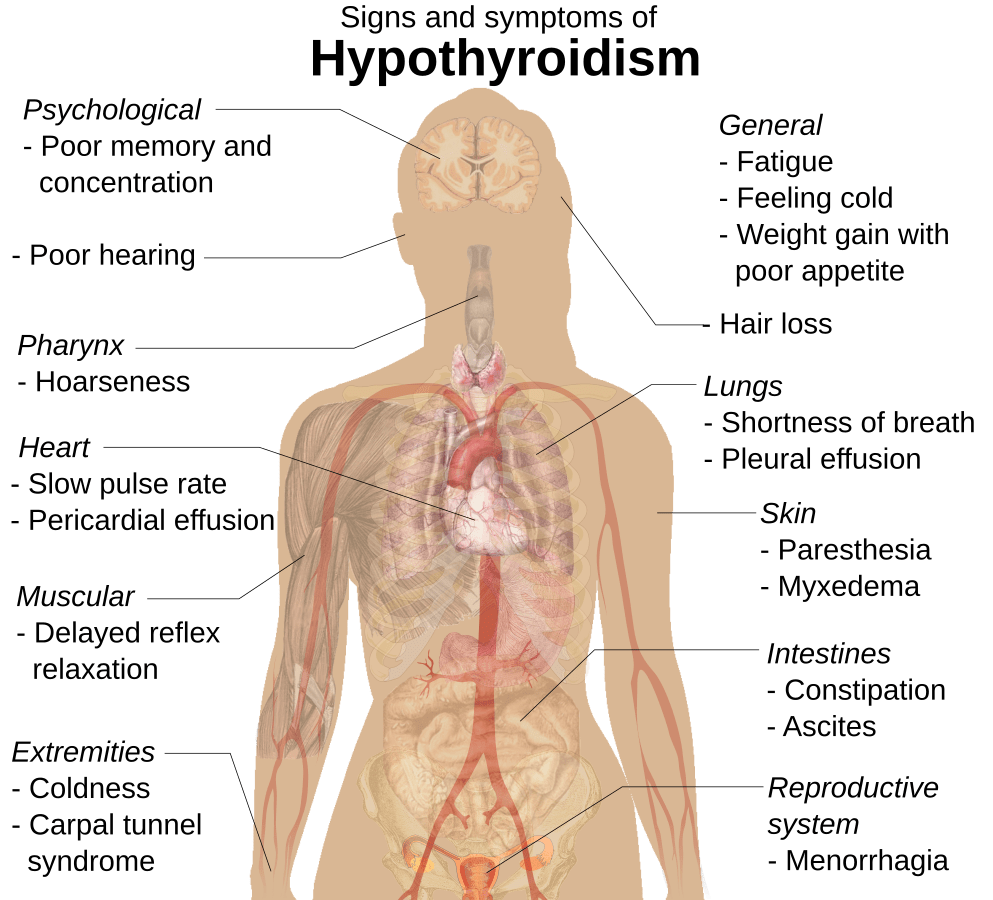

The Impact of Hypothyroidism: How to Recognize and Manage It
Introduction
Hypothyroidism is a prevalent endocrine disorder that can affect individuals of all ages. It often goes unnoticed due to its subtle onset and diverse symptoms which can lead to delays in diagnosis and treatment resulting in unnecessary suffering and complications.
In this article, we will delve into the causes of hypothyroidism, explore its symptoms, and discuss the treatment plans and dietary adjustments for the individuals with this condition.
What is Hypothyroidism?

The Thyroid Gland
- Located just below the Adam’s apple in front of the neck, the thyroid is a small, butterfly-shaped gland that produces two vital hormones, thyroxine (T4) and triiodothyronine (T3).
- These hormones are key to numerous physiological processes impacting both development and metabolism.
- Essential for cell differentiation and organ formation during development, these hormones also play a critical role in maintaining metabolic homeostasis in adults, making them indispensable for healthy bodily processes throughout life.
Hypothyroidism
Hypothyroidism, commonly referred to as an underactive thyroid, is characterized by the thyroid gland’s inability to produce enough hormones for the body’s requirements.
It impacts nearly every organ, causing a general slowdown in body functions.
What Causes Hypothyroidism?
Hypothyroidism can be categorized as either primary or secondary (central).
- Primary hypothyroidism occurs when the gland itself is not able to synthesize adequate hormones.
- On the other hand, secondary or central hypothyroidism is rare and results from dysfunction in the pituitary (the master gland) or the hypothalamus.
Various causes of hypothyroidism include:
- Autoimmune Disease: Hashimoto’s Thyroiditis is the most common cause of hypothyroidism in iodine-sufficient areas. Here, the immune system targets the thyroid, leading to fibrosis and atrophy.
- Thyroidectomy: Surgical removal of the gland or a part of the gland can contribute to hypothyroidism.
- Congenital hypothyroidism: Some infants are born without a thyroid or with an underdeveloped one. In others, defective genes can lead to abnormal synthesis of thyroid hormones.
- Thyroiditis: It refers to Inflammation of the thyroid gland following an autoimmune attack or viral infection. This results in the release of thyroid hormones into the bloodstream at once, leading to a temporary phase of hyperthyroidism, after which the gland becomes underactive.
- Radiation Therapy: Individuals who have received radiation treatment to the neck for other conditions (lymphomas, head, and neck cancers) are prone to develop hypothyroidism.
- I-131 Therapy: Prior use of radioactive iodine for the treatment of Grave’s disease or multinodular goiter can predispose individuals to develop hypothyroidism later.
- Iodine deficiency and excess: Iodine is a prerequisite for the gland to make thyroid hormones. Deficiency of iodine can lead to hypothyroidism. Excessive iodine can worsen hypothyroidism in people who are already affected by it.
- Medications: Various meds such as PAS, lithium, interferon-alpha, imatinib, sunitinib, and amiodarone are notorious for triggering hypothyroidism.
- Pituitary disorders: A rare cause of hypothyroidism is inadequate production of Thyroid Stimulating Hormone (TSH) by the pituitary gland, resulting in insufficient stimulation of the thyroid and consequently a reduction in thyroid hormone levels.
Symptoms of Hypothyroidism
Hypothyroidism can present with a wide range of symptoms varying from person to person. Some of the common ones include:
- Swollen neck due to enlarged thyroid gland
- Puffiness
- Fatigue
- Cold intolerance
- Decreased sweating
- Weight Gain
- Decreased appetite
- Constipation
- Slowed heart rate (Bradycardia)
- Muscle aches and pains
- Muscle stiffness
- Dry, flaky skin
- Thinning and loss of hair
- Sleep Disturbances
- Depression
- Menstrual Cycle abnormalities (Heavy, irregular periods)
- Infertility
These symptoms can profoundly affect an individual’s daily life, leading to decreased energy and impaired emotional well-being if not properly managed.
Approach To Diagnosing Hypothyroidism
Your healthcare provider will seek information about your medical history, ask about your symptoms, and conduct a physical examination.
To evaluate the Thyroid status, the tests conducted include:
- The thyroid profile: Serum TSH, free T3 and free T4. High TSH levels and low T4 levels point towards hypothyroidism .
- The lipid profile: Serum cholesterol and triglycerides (TG) levels are raised.
- Thyroid antibody blood tests: To diagnose autoimmune thyroid disorder.
- Imaging Tests: Thyroid ultrasound, Thyroid scan, and radioactive iodine uptake tests provide useful information about the structural integrity and overall function of the thyroid gland, aiding in the diagnosis of thyroid disorders.
Also, encourage your family members to get screened for thyroid disorders, as these conditions have significant hereditary influences.
Treatment Plan for Hypothyroidism
The management plan relies on substituting the hormone that your thyroid is unable to produce in sufficient quantities. You will be started on levothyroxine therapy, taken typically 30 minutes before breakfast.
After about 6-8 weeks of starting the medicine, the blood tests will be repeated to evaluate the thyroid hormone status. If needed, the dose will be adjusted to maintain the values within the desired range. Once the correct dose is established, you will have a blood test in 6 months and then annually thereafter.
When your thyroid hormone levels are restored to the normal range, your symptoms will start to improve. Regardless of feeling better, you should never make any changes or discontinue your medication without consulting your healthcare provider. Adhering to your treatment plan is essential for managing hypothyroidism and supporting long-term health.
Potential Complications of Hypothyroidism
Failure to treat hypothyroidism over time can result in significant health complications such as:
- Cardiovascular Problems: Prolonged hypothyroidism leads to elevated levels of LDL (Bad Cholesterol) which in turn increases the risk of heart disease and heart failure.
- Peripheral Neuropathy: Damage to the peripheral nerves can cause pain, numbness, and tingling sensation in arms and legs.
- Birth defects: Maternal hypothyroidism can adversely affect fetal neural development and may be associated with unfavorable pregnancy outcomes (Miscarriage, preterm delivery).
- Myxoedema Coma: It is rare but a life-threatening complication. It occurs in those with long-standing hypothyroidism, usually precipitated by infections or anesthetic agents. Patients present with decreased body temperature slowed heart rate, and depressed levels of consciousness leading to coma. It requires prompt emergency management.
Dietary Considerations for Hypothyroidism
While there is no best diet for hypothyroidism, a thoughtful and balanced diet, rich in key nutrients and low in potential irritants can promote overall health and may help manage symptoms.
Nutritious Foods for Thyroid Health
Including a variety of nutrient-dense foods can play a crucial role in supporting thyroid health. Here are a few suggestions.
- Centre your meals around high-fiber starchy foods such as sweet potatoes, brown rice, and whole grains.
- Incorporate Brazil nuts, tuna, eggs, and legumes (chickpeas, lentils) in your diet as these are rich in selenium, an essential nutrient for maintaining thyroid health.
- Prefer unsaturated oils (e.g. Extra-virgin Olive Oil) and be conscious of your intake.
- Including foods rich in zinc such as shellfish, beef, nuts, and pumpkin seeds can be beneficial.
- Choose dairy alternatives like almond milk and oat milk to help avoid potential inflammatory triggers.
Foods To Limit
When managing hypothyroidism, it is important to be mindful of certain foods that may negatively impact your thyroid function and overall health. These include:
- Gluten: Avoiding gluten-containing foods such as wheat, barley, and rye can be beneficial as they may contribute to inflammation and exacerbate the symptoms.
- Ultra-Processed Foods: It is best to steer clear of foods that tend to be high in unhealthy additives, sugars, and fats such as chips, sugary breakfast cereals, sweetened beverages, soft drinks, and sodas.
- Cassava: Also known as Yuca, it is a starchy root vegetable. When cooked, it releases certain toxins that can slow down thyroid hormone production. Therefore, it is best to avoid it if you are dealing with hypothyroidism.
- Soy products: You do not need to cut out soy entirely, but it is advisable to consume it in moderation as it can interfere with the absorption of thyroid medications. To optimize effectiveness, avoid soy products (Soybeans, soy milk, Tempeh) a few hours before and after taking your thyroid meds.
- Cruciferous Vegetables: When cooked, cruciferous vegetables (Cauliflower, Cabbage, Broccoli, Turnips, Arugula, Bok Choy, and Collard Greens) are a nutritious component of a balanced diet. However, consuming them raw and in excess can hinder iodine uptake by the thyroid gland leading to decreased hormone production and aggravating the symptoms of hypothyroidism.
Embracing a nutritious diet while being cautious about certain foods can certainly make a substantial difference. However, it is advisable to consult a healthcare professional or a registered dietician for personalized dietary recommendations.
Conclusion
Hypothyroidism is a significant health issue that affects millions worldwide, often leading to a variety of physical and emotional challenges. Early diagnosis and effective management are crucial for improving quality of life and preventing complications.
By cultivating a culture of awareness, education, and proactive care, we can empower individuals with hypothyroidism to achieve fulfilling lives and mitigate the disorder’s effects on their daily functioning.
- Hypothyroidism | Hashimoto's Disease | MedlinePlus
- Hypothyroidism (Underactive Thyroid) - NIDDK
- Hypothyroidism | American Thyroid Association
- Hypothyroidism - StatPearls - NCBI Bookshelf
- Hypothyroidism (underactive thyroid) - Symptoms and causes - Mayo Clinic
- Diets and supplements for thyroid disorders
- Hypothyroidism Diet: Foods to Eat, Avoid, and Meal Plan Ideas
- Diet for Hypothyroidism: What To Eat and Avoid

Dr Varsha Attri
MBBS
I’m a dedicated MBBS doctor with a strong passion for medical research. After graduating from SGRD University Of Health Sciences and working as a medical officer, I realized my passion for medical writing. I thrive on continuous learning and seek to expand my knowledge and skills in the field of Medical Journalism. Outside of medicine, I enjoy reading books and connecting with nature which fuel my creativity and inspire my writing. I’m eager to contribute meaningful content that informs and educates others in healthcare.








